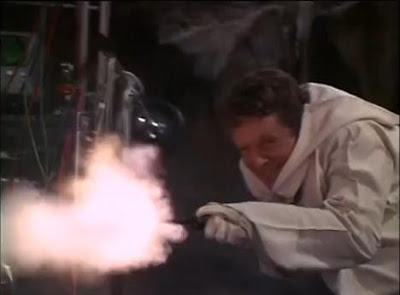It is 50 years ago today since Fall Out, the final episode of The Prisoner, was first broadcast on TV.
Love it or hate it, I doubt The Prisoner would be as memorable if it had not ended the way it did in Fall Out. Tying everything up by revealing the identity of Number One and the allegiance of the Village (the way Script Editor George Markstein had originally intended to) might have been neater in its way, but the almost infuriating intangibility of Fall Out's ending forces you to think about and interpret the series for yourself in a way that getting a neat sense of closure would not.
What is it that puts him over the edge here? It looks like the tipping point comes when his speech is drowned out by the shouting of the Village Assembly members. After that moment Number Six says nothing at all for the rest of the episode, his only dialogue coming from a playback of the line
"I will not be pushed, filed, stamped, indexed, briefed, debriefed, or numbered."from all the way back in Arrival. It seems he has decided that, if he cannot make himself heard, then actions speak louder than mews.
The sight of Number Six wielding a machine gun is pretty shocking (with All You Need is Love playing over it for an extra level of irony) considering how rarely he has used a gun in the series until this point (and, if you're one of those who believes Number Six is John Drake, even longer when counting the Danger Man series on top), but let's remember that he was driven to it in Living in Harmony as well. "Each man has his breaking point," said Number Two in Hammer Into Anvil. Now Number Six joins Roj Blake and Luke Skywalker as a heroic rebel.
The machine gun is only part of it - Number Six also fires the Village's rocket, although precisely how it being launched helps him and the others escape, and how much damage it does to the Village and to Rover (the Village's ultimate form of defence against escape... that we've seen) is one of the most unclear elements of this most opaque finale. One interpretation is that the launch, which causes a mass evacuation, destroys the Village entirely, and the rebels themselves escape in their truck only in the nick of time.
Rockets would have been on the minds of many viewers in 1968, as that was still in the middle of the space race between the USA and the USSR, with the Americans achieving the first mannyd orbit of the moon by the end of the year.
Fall Out was prescient regarding other events of 1968, with mass demonstrations and riots in American and European cities making the governments fear that revolution could have been imminent, even forcing the President of France to call an election to halt the violence. And the Soviet Union ruthlessly crushed attempts at democratic reform in Czechoslovakia using troops and tanks - the so-called "Brezhnev Doctrine."
The mere existence of Fall Out reminds us that morally justified violent revolution is a possibility, if our own societies ever fall into the sort of despotism seen in the Village... or the Soviet Union. If the powers-that-be are prepared to be violent against those they are ruling over, then they would be very happy if they thought those they were oppressing had ruled out the option of rising against them.
The democracies of the UK and USA have taken their knocks in recent years, with electoral systems (such as the UK's "first past the post") producing questionably legitimate governments, to say nothing of polarising referendums, but I would not advocate taking up arms in order to bring them down yet. Not when they seem to be in the middle of doing such a good job of that themselves, lol. And, of course, the USSR was not brought down by violent revolution in the end. Merely the threat, the possibility of an uprising turned out to be enough to force changes.
The British media, meanwhile, more and more comes to resemble the Village's Tally Ho - with newspapers that openly smear politicians they don't agree with and call judges "Enemies of the People" when they make a decision they don't like. Attempts to reform them are resisted under the cry of "freedom of the press" despite the fact that they exist to push the agendas of their shadowy billionaire owners - who resemble, if anything, the robed and masked members of the Assembly who seem to control the Village from behind the scenes and to whom even Number Two is answerable. They have the loudest voices, and when they shout they can prevent anyone else from being heard.
When put like that, what is it that we poor, lone cats can do versus those who wield such power? Maybe not much, but we can start by asking pertinent questions, and who knows where it will go from there?
Try not to break too many saucers along the way.















No comments:
Post a Comment